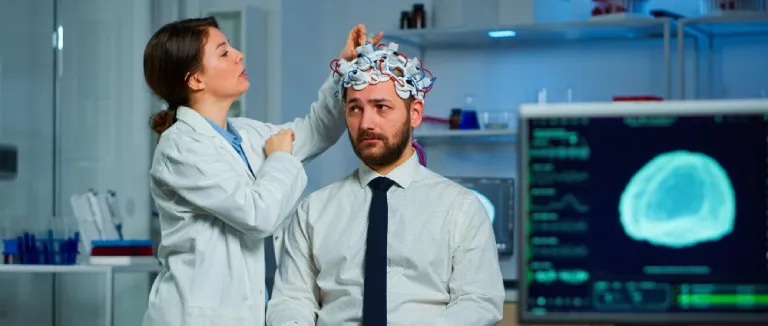What is Brain Tumors? Symptoms af a Brain Tumor
Brain tumors are a complex and often life-altering medical condition that affects thousands of people worldwide. Brain tumors, whether benign or malignant, can significantly lower a person's quality of life. Early detection is essential for the right course of care. Explore signs of a brain tumor, cancer symptoms, and the experiences of some people who have dealt with this challenging diagnosis in this blog.

Tumors: An Overview
Unusual and excessive tissue growths in the body are called tumors. They can arise in different tissues or organs or be benign or malignant (cancerous). There is frequent confusion between "tumor" and "neoplasm."
Benign Tumors:
Benign tumors are non-cancerous tumors that usually do not invade neighboring tissues or spread to other body parts. They are frequently encapsulated and have distinct borders. Benign tumors are typically not life-threatening, though they could pose a risk if they press on nearby organs or structures. Skin moles, uterine fibroids, and certain brain lesions, such as meningiomas, are typical instances of benign tumors.
Malignant Tumors:
Malignant tumors, on the other hand, are cancerous growths that can infiltrate nearby tissues and travel to other parts of the body through the lymphatic or circulatory systems. Within malignant tumors, cancerous cells can divide uncontrollably and grow quickly and uncontrollably. When cancer is diagnosed, malignant tumors are the leading cause of concern because they are extremely dangerous to one's health and, if left untreated, can result in severe illness or even death.

Symptoms Of A Brain Tumor
Since the brain is a complicated organ, tumors can present in various ways. It is crucial to recognize the symptoms of brain tumors to diagnose and treat them early. They can include the following:
- Headaches: A brain tumor may cause frequent, excruciating headaches that worsen in the morning or when you move positions.
- Seizures: Unknown causes of seizures or an abrupt start to convulsions may be signs of brain tumors or lesions.
- Vision Changes: It is possible to experience visual disturbances like double or blurry vision, loss of peripheral vision, or flashing lights.
- Balance and Coordination Issues: Unexpected lightheadedness, unsteadiness on balance, or difficulties with coordination may indicate a brain tumor.
- Vomiting and Nausea: If vomiting and nausea are persistent and unrelated to other medical conditions, this may also cause concern.
- Weakness or Numbness: Abrupt numbness, tingling, or weakness in the arms or legs may indicate a brain issue.
- Personality and Behavior Changes: An individual's personality and behavior may be impacted by a brain tumor, resulting in mood swings, irritability, or even altered social interactions.
- Memory and Cognitive Changes: Brain tumors may cause problems with thinking, memory, and concentration.
Seeking medical attention as soon as you notice any concerning brain tumor signs in yourself or a loved one is imperative. You can make an appointment with Liv Hospital’s healthcare provider in Istanbul right now!
Symptoms Of Brain Cancer
Malignancy in brain tumors can indicate signs of cancer that are more severe. Signs of brain cancer include:
- Worsening Headaches: As a tumor expands, headaches may worsen and last longer.
- Changes in Mental Function: Confusion, memory issues, and trouble performing daily tasks can result from brain cancer-related changes in mental function.
- Personality Changes: Brain cancer patients may experience profound personality changes in some instances, which can be difficult for them and their loved ones.
- Speaking Difficulties: This can include slurred words, impaired speech, or trouble putting thoughts into words.
- Vision Issues: One or both eyes may become wholly or partially blind as a result of tumor brain cancer.
- Loss of Motor Skills: When a tumor affects the brain's motor regions, paralysis, muscle weakness, and loss of coordination may occur.
- Seizures: People with brain cancer symptoms may experience more frequent and severe seizures.
- Vomiting and Nausea: These brain tumor symptoms can worsen when a brain tumor becomes malignant.
Don't wait if you or a loved one is worried about possible cancer signs. Your health is extremely important, and early detection can save your life. For a comprehensive assessment and professional advice on managing and treating cancer signs, you can get in touch with Liv Hospital in Istanbul right now. This is where your path to improved health begins.

Personal Story: How I Knew I Had A Brain Tumor
Let's examine the experiences of a brave basketball player who confronted this diagnosis to comprehend the practical implications of brain tumors and their symptoms. NBA legend Dikembe Mutombo disclosed his fight with a brain tumor in 2017. Known for his commanding presence on the court, Mutombo eventually sought medical assistance due to the symptoms he was experiencing. He claimed to have had extreme headaches, blurred vision, and even passed out during a standard examination. By seeking medical advice, Mutombo was able to successfully undergo surgery and receive a diagnosis of a benign brain tumor, which ultimately saved his life. His experience serves as a reminder of how critical it is to identify symptoms and seek prompt medical attention.
Though diagnosing and treating brain tumors at an early stage requires knowledge of the symptoms, doing so is the first step towards overcoming their formidable challenge. Dikembe Mutombo's journey as a brain tumor basketball player exemplifies how vital it is to take symptoms seriously and contact medical professionals immediately.
Do not wait to get medical help if you or someone you know is exhibiting symptoms that could point to a brain tumor. As long as they receive prompt care and support, many people can continue to lead happy lives after being diagnosed with a brain tumor, thanks to advancements in medical science.
Frequently Asked Questions
Brain tumors are diagnosed through neurological examinations and imaging tests such as MRI or CT scans. If a tumor is detected, a biopsy may be performed to determine its type and whether it is benign or malignant.
Treatment options depend on the tumor’s type, size, and location, as well as the patient’s overall health. Management may include surgery, radiotherapy, chemotherapy, targeted therapy, or a combination of these approaches to control or remove the tumor and relieve symptoms.
Symptoms may include persistent or worsening headaches, seizures, nausea and vomiting, vision or speech problems, balance difficulties, memory changes, or weakness in the arms or legs. The type and severity of symptoms depend on the tumor’s size, type, and location.
* Contents of this page is for informational purposes only. Please consult your doctor for diagnosis and treatment. The content of this page does not include information on medicinal health care at Liv Hospital






.webp)

